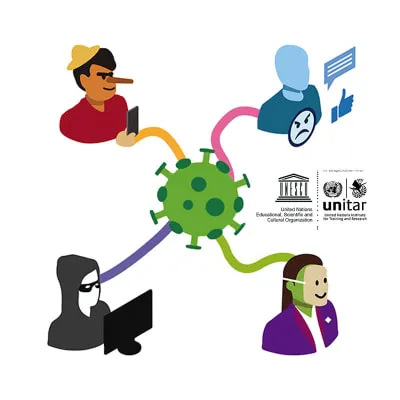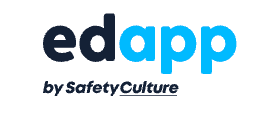
Combating the Disinfodemic: Working for truth in the time of COVID-19 
Discover the truth amidst the chaos of COVID-19 with the course "Combating the Disinfodemic: Working for truth in the time of COVID-19." In collaboration with UNESCO and UNITAR, this course delves into the dangerous world of disinformation surrounding the pandemic. Gain critical insights into the impact of false information on public health measures and learn how to access reliable sources. With the term "disinfodemic" coined to describe this parallel pandemic, this interactive course is a must for those seeking to combat misinformation and protect lives. Join the collaboration between UNESCO and UNITAR and be part of the solution. ▼
ADVERTISEMENT
Course Feature
![]() Cost:
Cost:
Free
![]() Provider:
Provider:
Edapp
![]() Certificate:
Certificate:
Paid Certification
![]() Language:
Language:
English
![]() Start Date:
Start Date:
Self-enroll
Course Overview
❗The content presented here is sourced directly from Edapp platform. For comprehensive course details, including enrollment information, simply click on the 'Go to class' link on our website.
Updated in [September 27th, 2023]
What does this course tell?
(Please note that the following overview content is from the original platform)This UNESCO x UNITAR collaboration builds your understanding of the disinfodemic and the role of truth in the time of COVID-19 Access to reliable and accurate information is critical at the best of times but during a crisis it can be a matter of life and death Unless otherwise stated all work by UNESCO is licensed under the Creative Commons Attribution-ShareAlike 30 IGO License What is a disinfodemic? A disinfodemic refers to the overabundance of wrong information about the pandemic or the viral load' of disinformation that undermines the public health response to COVID-19 This leads to the poor observance of public health measures which has endangered countries ability to stop the pandemicCOVID-19 has led to a parallel pandemic of disinformation that directly impacts lives and livelihoods around the world Falsehoods and misinformation have proven deadly and sowed confusion about life-saving personal and policy choices To #ShareKnowledge UNESCO and UNITAR have collaborated to bring to mobile e-learning two UNESCO policy briefs offering critical insights into the fast-growing COVID-19-related disinformation that is impeding access to trustworthy sources and reliable information The impacts of COVID-19 disinformation are more deadly than disinformation about other subjects such as politics and democracy That is why this research in line with UNESCO's role as a laboratory of ideas coins the term disinfodemic to describe the problem This interactive course is a collaboration between the UNESCO Sector for Communication and Information and the UNITAR Divisions for Multilateral Diplomacy and Prosperity
We considered the value of this course from many aspects, and finally summarized it for you from two aspects: skills and knowledge, and the people who benefit from it:
(Please note that our content is optimized through artificial intelligence tools and carefully reviewed by our editorial staff.)
What skills and knowledge will you acquire during this course?
During this course, participants will acquire the following skills and knowledge:
1. Understanding the concept of a disinfodemic: Participants will gain a comprehensive understanding of what a disinfodemic is, which refers to the abundance of false information about the COVID-19 pandemic. They will learn about the detrimental effects of disinformation on public health responses and the potential consequences for individuals and communities.
2. Recognizing the role of truth in the time of COVID-19: Participants will explore the importance of reliable and accurate information during a crisis, particularly in the context of the COVID-19 pandemic. They will understand how misinformation and falsehoods can undermine public health measures and contribute to the spread of the virus.
3. Accessing trustworthy sources and reliable information: Participants will learn strategies and techniques to identify and access trustworthy sources of information related to COVID-19. They will understand the importance of fact-checking and verifying information before sharing it with others.
4. Analyzing the impacts of COVID-19 disinformation: Participants will gain insights into the specific impacts of COVID-19 disinformation on individuals, communities, and societies. They will understand how false information can lead to confusion, fear, and potentially harmful decision-making.
5. Developing critical thinking skills: Participants will enhance their critical thinking skills to evaluate information critically and discern between reliable and unreliable sources. They will learn to question and analyze information before accepting it as true.
6. Promoting media literacy: Participants will learn about the importance of media literacy in combating the disinfodemic. They will understand how to navigate through various media platforms and identify trustworthy sources of information.
7. Collaborating for effective communication: Participants will explore the role of collaboration and effective communication in combating the disinfodemic. They will learn how to work together with different stakeholders to promote accurate information and counter misinformation effectively.
8. Applying policy insights: Participants will gain policy insights from UNESCO's policy briefs on COVID-19-related disinformation. They will understand the importance of policy interventions in addressing the disinfodemic and promoting access to reliable information.
Who will benefit from this course?
This course will benefit individuals and professionals who are interested in combating the spread of disinformation during the COVID-19 pandemic. Specifically, it will be beneficial for:
1. Journalists and media professionals: They will gain a deeper understanding of the disinfodemic and learn how to effectively report on COVID-19-related information, ensuring accuracy and reliability in their reporting.
2. Public health officials and policymakers: They will learn about the impact of disinformation on public health measures and how to counteract it. This knowledge will help them make informed decisions and develop effective strategies to combat the spread of false information.
3. Educators and researchers: They will gain insights into the disinfodemic and its effects on education and research. This will enable them to develop educational programs and conduct research that addresses the challenges posed by misinformation during the pandemic.
4. Communication professionals: They will learn how to effectively communicate accurate information about COVID-19 to the public, countering the spread of disinformation and ensuring the dissemination of reliable information.
5. Civil society organizations and activists: They will acquire knowledge and tools to identify and counteract disinformation, enabling them to protect vulnerable communities and advocate for truth and accuracy in public discourse.
Course Syllabus
Introducing the Disinfodemic
Main Disinfodemic Types
Key Themes of the Disinfodemic
Identifying Disinformation
Producers and Distributors
Production and Distribution
Supporting the Disinformation Target Audiences
Options for Action
Acknowledgements
Course Provider

Provider Edapp's Stats at AZClass
Discussion and Reviews
0.0 (Based on 0 reviews)
Explore Similar Online Courses

Fundamentals of Data Visualization

STEAL this LOCAL SEO Strategy

Python for Informatics: Exploring Information

Social Network Analysis

Introduction to Systematic Review and Meta-Analysis

The Analytics Edge

DCO042 - Python For Informatics

Causal Diagrams: Draw Your Assumptions Before Your Conclusions

Whole genome sequencing of bacterial genomes - tools and applications

Infection Control

Interior Facility Care (Fast Casual)


Start your review of Combating the Disinfodemic: Working for truth in the time of COVID-19